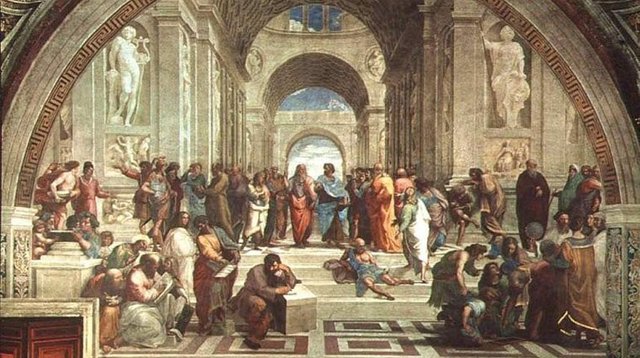Ancient philosophy. Heraclitus - there is an eternal movement in the world, and what is always seen is deceit /part 3/
From the collision of opposites comes the movement and the change, the development. If there was not a collision and a dialectical passage of anything to the contrary, there would be no diversity and fullness in the world. That is why Homer was not right, Heraclitus said, wishing to cease the struggle between the gods and the people. He did not understand that he was praying for the destruction of the universe, because if his request were fulfilled, all things would be gone. For Heraclitus, the struggle between opposites does not deny the harmony of the world.
On the contrary, true harmony results precisely from opposites (opposites); if it is expressed in the language of music - it is similar to the contrapuntal harmony. The movement of the arrow comes from the struggle between the bow of the bow and the man's hand that fills it. The sounds of the lyre come from stretching the strings and fighting the moving fingers. So everything is moved by mutual strain, and at rest it will go to break-up and extinction. The constant movement in the world and the struggle of opposites, after all, according to Heraclitus, are due to a basic element or force-fire. Some have assumed that the water is the base, or according to the Anaxime-air. In fact, the fire at Heraclitus is not an element. Even the opposite - while the elements are the lasting, the sustained, the everlasting in the change, the fire is what moves the eternal change. This sense has the assertion that everlasting fire forms the basis of the universe, but not as a lasting substance, but as a constant process from which the things appear and disappear. The tongue of Heraclitus - says Vindelband - in places is such that it could be assumed that he just in the place of water and the air put bends. But if we look deeper, it turns out that the meaning of the word i arhe is quite different.
Indeed, the fire is identical on the one hand with the divine. This unified omnipresent entity, embodied by fire, is the very universal movement, the very origin. In fact, Heraclitus's thought is very simple, and for her we have a propensity in our philosophy. It is because it is precisely under the influence of heat that things change their physical state and their chemical properties. Water under the influence of heat passes from solid to liquid gaseous state, and the hardest metals are said to liquefy and even evaporate from the high temperature. Therefore attempts to interpret the teaching of Heraclitus purely externally, that he through the constant flickering of the fiery flame symbolizes the eternal movement in the world and therefore called the fire a world-wide essence, are not only unfortunate but also leading to delusion. On the contrary, the fire takes as its intrinsic force that makes it change not only quantitatively but also qualitatively.
"Everything is one and one is everything. Life and death, sleep and vigil, youth and old age, pleasure and suffering are a state of the same being and pass through one another (fragment 88). Even in the whole universe there is a circle, so the end is gathered with the beginning. Since, according to Heraclitus, God, the Godhead is immanent to nature itself, that is why it is unity, a coincidence of opposites. "God is day and night, winter and summer, war and peace, abundance and destitution. And everyone gives them, according to their desire, calling them something in part when it is actually all. "(Fragment 67).

Reading a little more about him, I found something that I loved: The universal process is cyclical: after the "great year", all things become "fire" again.👌
This post has received a 4.48 % upvote from @boomerang.
Upvoted.